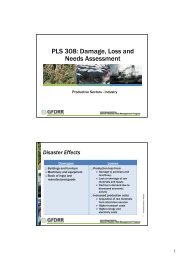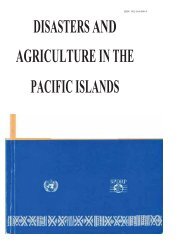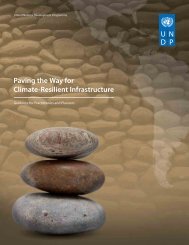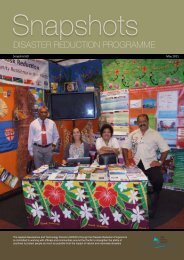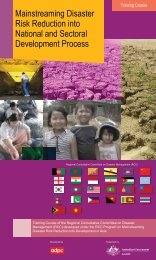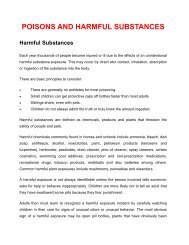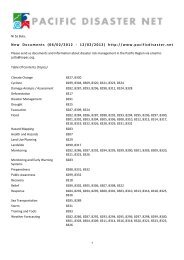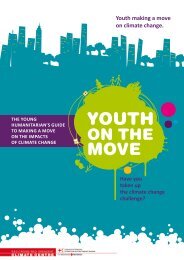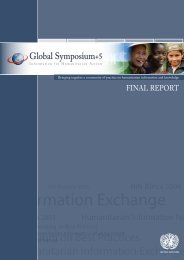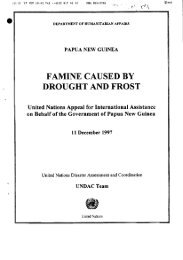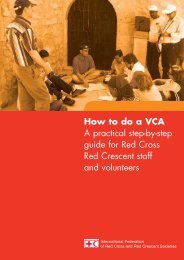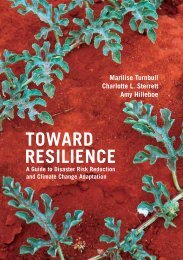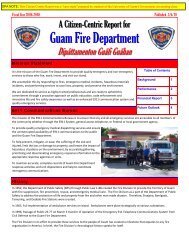Download PDF - ReliefWeb
Download PDF - ReliefWeb
Download PDF - ReliefWeb
You also want an ePaper? Increase the reach of your titles
YUMPU automatically turns print PDFs into web optimized ePapers that Google loves.
OCHA Situation Report<br />
Protection<br />
Cluster Leads: UN Office of the High Commissioner for Human Rights (OHCHR) &<br />
United Nations Refugee Agency (UNHCR)<br />
Needs: In the transition from the emergency to early recovery phase, when human and financial resources<br />
mobilised for the emergency response are reduced or re-allocated, there is a need for active monitoring of<br />
the situation and coping strategies of those affected, with particular regard to:<br />
Harms arising from the medium-longer term secondary impacts of the disaster including food<br />
insecurity, income and livelihoods insecurity, nutrition deficiencies, negative impacts on health and<br />
wellbeing;<br />
Ensuring appropriate transitional and permanent shelter arrangements for flood-affected families in<br />
rural, urban and squatter areas, whose homes are severely or completely damaged;<br />
Provision of psychosocial support to flood-affected people experiencing distress, anxiety and<br />
frustration as they face the challenge of rebuilding their lives and livelihoods;<br />
Provision of psychosocial support to government and non-government first-responders;<br />
Ensuring that protection considerations of safety, wellbeing and dignity are integrated into early<br />
recovery interventions across all sectors.<br />
Response:<br />
The Protection Cluster continues to link with responding agencies for information-gathering and<br />
dissemination around protection. The Cluster is maintaining contact with the National Disaster<br />
Management Office (NDMO) and relevant Ministries to offer protection guidance and monitoring<br />
support throughout the recovery period.<br />
The Protection Cluster representatives participated in a field visit to the Western Division in early<br />
May to explore protection issues that were highlighted throughout the response. A summary of this<br />
field visit has been developed.<br />
The Protection Cluster is working collaboratively with the Health Cluster to explore ways of working<br />
with the Ministry of Health and Ministry of Social Welfare to support effective post-disaster mental<br />
health and psychosocial support interventions, at government, non-government and community<br />
levels. This includes (i) development and dissemination of key ‘psychological first aid’ messages; (ii)<br />
mapping of key Mental Health and Psychosocial Support Service (MHPSS) providers (iii)<br />
development of specific training resources & information, education and communication materials<br />
on ‘MHPSS in emergencies’ (iv) development of a project proposal for a capacity-building program<br />
on ‘MHPSS in emergencies’ targeting a range of formal and informal MHPSS providers.<br />
Gaps & Constraints: In terms of gaps, little information is available on plans or processes for monitoring<br />
coping strategies and protection risks among flood-affected communities in the recovery period. This is<br />
critical in order to:<br />
Prevent and respond to negative coping strategies such as violence, crime, substance abuse, and<br />
exploitation of women and children<br />
Ensure that response and recovery programs do not cause further harm (need to assess potential<br />
counter-protective impacts of response and recovery interventions)<br />
Water, Sanitation and Hygiene<br />
Cluster Lead: United Nations Children’s Fund (UNICEF)<br />
Needs: In the absence of a comprehensive assessment, it is still very difficult to know the scale of damages<br />
to water and sanitation infrastructure particularly in rural areas affected by the floods. The Water Authority<br />
Fiji (WAF) reports that water supply systems have been restored to over 95 per cent of all urban areas.<br />
However there are no clear statistics for rural areas. The department of health with a mandate for rural<br />
sanitation, hygiene and water quality, is conducting a needs analysis which should inform future water,<br />
sanitation and health (WASH) interventions.<br />
Damaged infrastructure (pumps, piping, etc.) has been repaired while new replacements have been ordered<br />
for installation in the near future. WAF has allocated the majority of the FJ$1.85 million grant from the Asian<br />
Development Bank (ADB) for this work, in addition to a FJ$1.85 million grant from the ADB received<br />
following the January floods.<br />
Response: A joint mission of UNICEF, OCHA, United Nations Population Fund (UNFPA), OHCHR, FRCS<br />
and MoH visited the affected areas during the first week of May to monitor the distribution and use of life<br />
saving supplies handed over to FRCS. According to initial findings all target households received the<br />
supplies and were using them with very few exceptions. Families who had returned from the evacuation<br />
centers had soap, water containers, water purification tablets and communication materials in local<br />
languages.<br />
www.unocha.org<br />
The mission of the United Nations Office for the Coordination of Humanitarian Affairs (OCHA) is to mobilize and coordinate effective<br />
and principled humanitarian action in partnership with national and international actors.<br />
4



